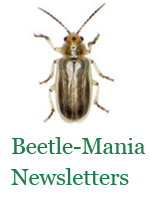Niphograpta albiguttalis (Warren) (formerly Sameodes albiguttalis
[Lepidoptera: Pyralidae]
Scientific name status: also referred to Epipagis albiguttalis (Warren)
Biology | History | Status | Management | Weeds | Literature | Links
DeLoach (1978) studied the biology of this moth.
Niphograpta albiguttalis was released at 20 sites in Florida in 1976. It became established at or near 16 sites and continued to spread beyond these sites (Center and Durden 1981).
This moth is probably wide spread and continues to contribute to the biological control of water hyacinth.
A variety of release methods are successful (Center and Durden 1981). Establishment was best when 1st instar larvae were release during October through March. Populations established best on young plants with good growth.
Niphograpta albiguttalis host range was studied by Cordo and DeLoach (1978).
Center, T. D., and W. C. Durden. 1981. Release and Establishment of Sameodes albiguttalis for the Biological Control of Waterhyacinth. Environ. Entomol. 10: 75-80.
Cordo, H. A., and C. J. DeLoach. 1978. Host specificity of Sameodes albiguttalis in Argentina, a biological control agent for waterhyacinth. Environ. Entomol. 7: 322-328.
DeLoach, C. J. 1978. Life history and ecology of the moth Niphograpta albiguttalis (formerly Sameodes albiguttalis a candidate for biological control of waterhyacinth. Environ. Entomol. 7: 309-321.
Perkins, B. D. 1973. Potential for waterhyacinth management with biological agents. Proc. Tall Timbers Conf. Ecol. Anim. Control Habitat Manage. 4: 53-64.

